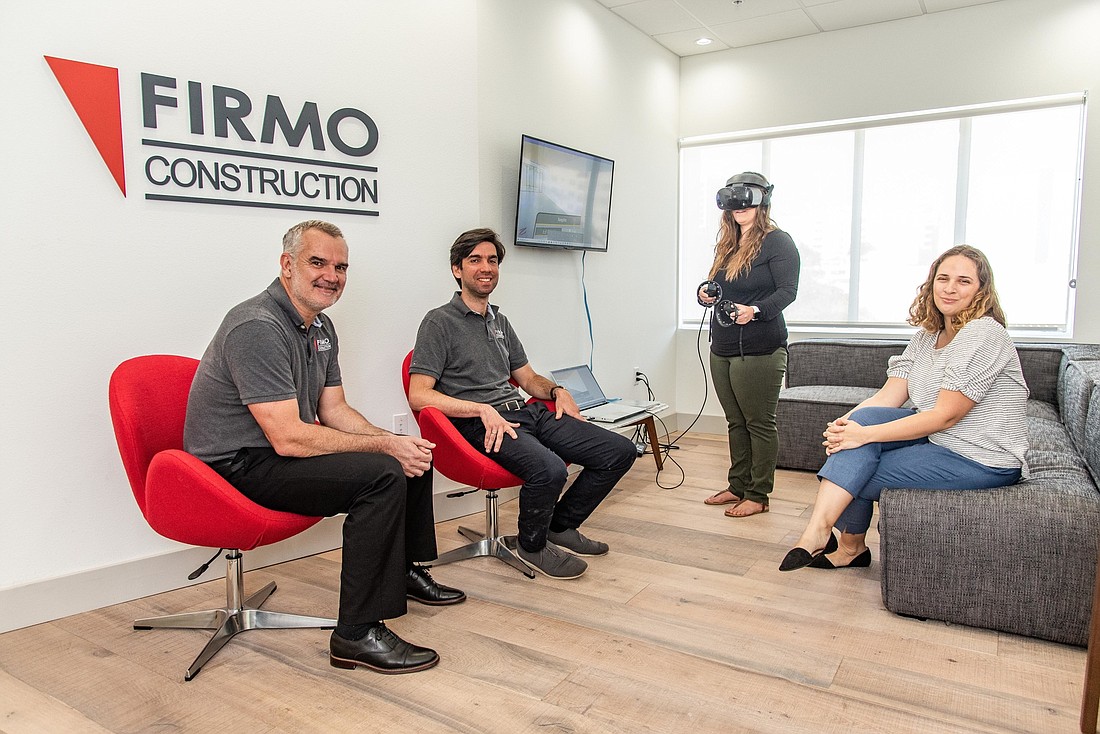- December 13, 2025
-
-
Loading

Loading

In recent years, virtual reality has entered more realms of life. It’s used for entertainment, sure, but also for education, journalism and health care. Virtual reality is helping businesses in a variety of industries too, including construction.
Many companies now use virtual reality to show their clients what the end product will look like, doing virtual walk-throughs with them of a finished building.
Sarasota-based construction management firm Firmo Construction has taken it a step further. It’s using virtual reality to troubleshoot problems before construction even begins. The idea is to anticipate and resolve problems prior to them happening on the construction site. By creating more predictability and precision and fixing issues ahead of time, Firmo officials say they can save their clients both time and money.
‘Ultimately, it’s going to make each trade more productive because there’s less time on site trying to troubleshoot something.’ — Stefan Baron, Firmo Construction
Firmo Construction President Eric Collin says the VR and design software already existed, but they’ve harnessed it in a new way. “What we’re offering is how we utilize it,” he says. “When someone comes to us and buys our virtual reality design-build package, we show our subcontractors the models.”
Subcontractors travel to the Firmo office and put on VR headsets. Framers, for instance, can take a virtual trip into a building lobby and see all of the details in the ceiling. Many of the issues that come up relate to coordination between the trades, including issues like the placement of gas and electric lines or making sure sprinkler systems don’t run into ductwork. “A lot of times you can right some discrepancy,” Firmo Construction Vice President of Operations Stefan Baron says. “I think the VR application on this allows it to be identified quickly.”
Savings for clients come on two fronts, according to Baron. One is financial savings, which if estimating, he says can amount to about 5% of the project value. The technology also saves time. “That is definitely something we see right from the design stages,” he says. “On a hospitality project, if we can cut down on the design phase by a month or two months, the hotel will generate revenue two months earlier. It’s a tremendous advantage for the client going that route.”
Firmo is employing the VR technology now with two projects, a Hampton Inn and Suites in Panama City and a Tru by Hilton hotel under construction in Bradenton.
“Clients have been really receptive to the predictability of our contract,” Collin says. For one, the technology has allowed contracts to be modified to remove change order terms. “When you go see an owner and you tell them you’re removing all this unpredictability and potential cost increase, that’s an attractive proposition,” he says. Firmo has been pitching the option frequently. “From small developers to large national ones, we have had good feedback so far,” Collin says.
Firmo officials say the technology works best if the firm is involved in a project from the beginning. “Ultimately, it’s going to make each trade more productive because there’s less time on site trying to troubleshoot something,” says Baron. “It’s already done, and the execution of the project is much smoother as it relates to every trade on the job site.”
Collin isn’t aware of other firms using VR technology the same way Firmo is. “I think it goes back to change,” he says. “When things are going well, you don’t have to think too much about going outside of the box.” He thinks it will become more standard, though. “Imagine a manufacturer who doesn’t know end cost of a phone it’s building plus or minus 10%,” he says. “Imagine an industry that operates like that. There’s just a lot of wasted time, and it’s just not acceptable anymore.”